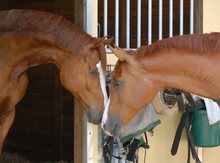Horse health is one of the most important issues in the equine industry. Just like humans, horses have their own health concerns, including emerging infectious diseases. Horses by nature are social creatures, and many travel extensively, locally, nationally or internationally through competing and global sales.

Horses as social animals
Horses by nature are social creatures, and many travel extensively, locally, nationally or internationally through competing and global sales leading to the risk of transmitting infection.
This means the risk of infection has never been more prevalent. Scientists have developed vaccines and treatments for various infections, but the pathogens involved have adapted, becoming more drug-resistant and infectious.
To combat this situation, researchers such as Dr. Scott Weese, from the Ontario Veterinary College, are investigating known and emerging infectious diseases. Weese studies the effects and changes in microbial populations in the horsesâ digestive tracts, sources and carriers of infections, and investigates methods to control transmission of pathogens.
In particular, he focuses on bacterial changes that can cause diarrhea or colic (including Clostridium difficile, a spore-forming bacterium that can cause diarrhea and inflammation of the colon) and various other important causes of disease such as equine influenza virus and equine herpesvirus.
Infectious diseases are often the cause of changes in horse health trends.
Weeseâs research contributes to understanding how these pathogens operate and spread and their effects. This provides vital information for learning how to treat infected horses. âScientists will never be able to completely eradicate infectious diseases, and pathogens will always evolve,â says Weese, âbut this research will enable veterinarians to more easily recognize signs of disease, diagnose problems, and ultimately reduce sickness and suffering.â
Learn more about biosecurity. Equine Guelph's next 2-week Biosecurity eWorkshop is offered April 20 - May 4.
- Identify risks in your barn
- Apply practical ways to reduce your risks
- Reduce chances of sickness in your horse
Sign up at: EquineGuelph.ca
Equine Guelph is the horse ownersâ and care giversâ Centre at the University of Guelph. It is a unique partnership dedicated to the health and well-being of horses, supported and overseen by equine industry groups. Equine Guelph is the epicentre for academia, industry and government â for the good of the equine industry as a whole. For further information, visit www.EquineGuelph.ca.
Story by Jillian Dasti
